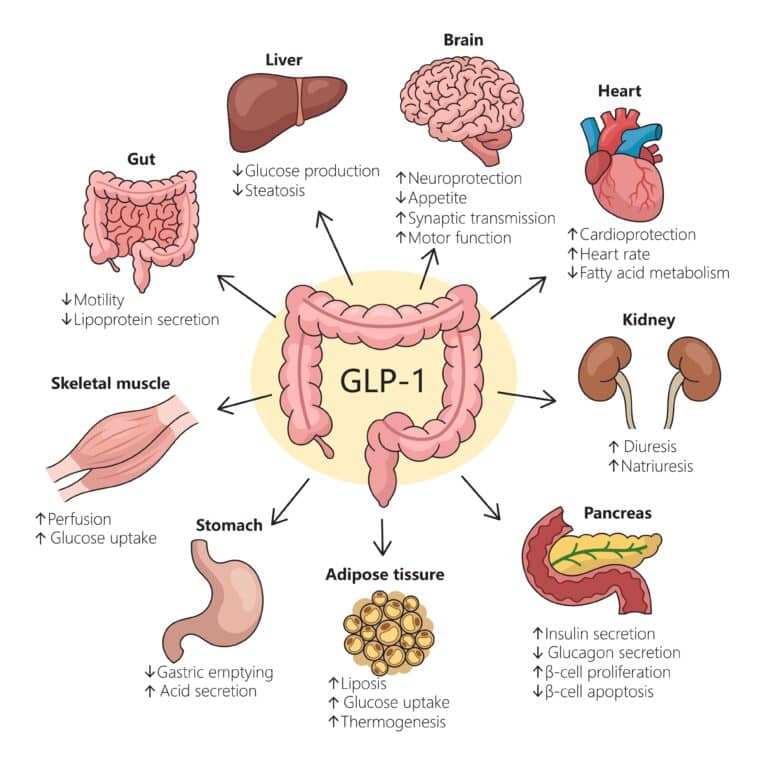GLP-1, or glucagon-like peptide-1, is a naturally occurring hormone in the human body that plays a critical role in regulating blood sugar levels, appetite, and insulin secretion.1 With the growing interest in weight management and metabolic health, GLP-1 supplements have emerged as a promising tool in addressing issues like obesity, diabetes, and even cardiovascular health.


How GLP-1 Works
It is a hormone released in response to food intake, particularly from the gut. It signals the pancreas to produce insulin, helping to lower blood sugar levels after meals. It also slows down gastric emptying, which helps to regulate appetite by making people feel fuller for longer.2
GLP-1 receptor agonists, also known as GLP-1 analogs, are medications that help manage blood sugar levels in people with type 2 diabetes. They work by mimicking the hormone, which is naturally released by the intestine after eating. For those with type 2 diabetes, these medications trigger insulin production to control blood sugar levels.3 Additionally, they help reduce appetite and food intake, leading to weight loss. Although these drugs have been used to treat type 2 diabetes for nearly two decades, it was not until 2021 that the US FDA approved them for treating obesity.4
Managing Weight Naturally
Not everyone wants to take medications to control their weight, and they can be expensive and inaccessible to some. GLP-1 production can be increased by consuming healthy foods that also reduce the risk of cardiovascular disease and cancer. Foods containing healthy fats, such as salmon, herring, avocado, and olives, are great for raising the hormone’s levels. High-quality protein from fish, chicken, and beans, along with soluble fiber from fruits, vegetables, and whole grains, are also excellent for raising GLP-1 level.5
Besides daily food items, TCI’s GLP-1 Formula can also boost body’s natural production of the hormone, reduce cravings, and enhance weight management without the need for injections. These supplements offer an alternative to medications, aiming to enhance weight management and overall health without the need for injections.
GLP-1, as a key hormone in the incretin family, plays crucial roles in multiple physiological functions. Supplements and receptor agonists medications have emerged as essential therapeutic options for managing weight, while also showing promise in treating disorders beyond diabetes and obesity.
1. Baggio, L. L., & Drucker, D. J. (2007). Biology of incretins. Gastroenterology, 132(6), 2131–2157.
2. D’Alessio, D. (2016). Is GLP 1 a hormone: Whether and When? Journal of Diabetes Investigation, 7, 50-55.
3. Drug Approval Package: Ozempic (semaglutide) Injection. (2018, January 16). https://www.accessdata.fda.gov/drugsatfda_docs/nda/2017/209637Orig1s000TOC.cfm
4. FDA Approves New Drug Treatment for Chronic Weight Management, First Since 2014. (2021, June 4). FDA. https://www.fda.gov/news-events/press-announcements/fda-approves-new-drug-treatment-chronic-weight-management-first-2014
5. Paniagua, J. A., De La Sacristana, A. G., Sánchez, E., Romero, I., Vidal-Puig, A., Berral, F. J., Escribano, A., Moyano, M. J., Peréz-Martinez, P., López-Miranda, J., & Pérez-Jiménez, F. (2007). A MUFA-rich diet improves posprandial glucose, lipid and GLP-1 responses in insulin-resistant subjects. Journal of the American College of Nutrition, 26(5), 434–444.
GLOBAL TOTAL SOLUTION
TCI provides continuous 24/7 services, supporting you through every phase of the process. We offer everything from market analysis and product development to packaging production and customer support, ensuring a smooth launch of your products in the international market.
